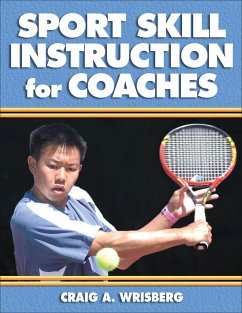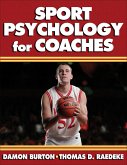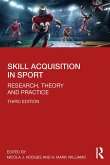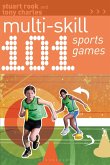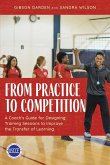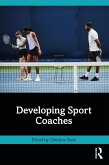Craig A. Wrisberg
Sport Skill Instruction for Coaches
Craig A. Wrisberg
Sport Skill Instruction for Coaches
- Broschiertes Buch
- Merkliste
- Auf die Merkliste
- Bewerten Bewerten
- Teilen
- Produkt teilen
- Produkterinnerung
- Produkterinnerung
Aimed at coaches, PE teachers and professionals working with athletes, this work is designed to introduce sport science topics to coaches, as well as how these concepts can be applied to enhance sports performance. It is divided into three sections: Foundations of Skill Instruction, Skills Your Athletes Need and Designing Practice Sessions.
Andere Kunden interessierten sich auch für
![Sport Psychology for Coaches Sport Psychology for Coaches]() Damon BurtonSport Psychology for Coaches52,99 €
Damon BurtonSport Psychology for Coaches52,99 €![Skill Acquisition in Sport Skill Acquisition in Sport]() Skill Acquisition in Sport52,99 €
Skill Acquisition in Sport52,99 €![Developing Sport Coaches Developing Sport Coaches]() Developing Sport Coaches198,99 €
Developing Sport Coaches198,99 €![101 Multi-skill Sports Games 101 Multi-skill Sports Games]() Stuart Rook101 Multi-skill Sports Games25,99 €
Stuart Rook101 Multi-skill Sports Games25,99 €![From Practice to Competition From Practice to Competition]() Gibson DardenFrom Practice to Competition37,99 €
Gibson DardenFrom Practice to Competition37,99 €![Skill Acquisition in Sport Skill Acquisition in Sport]() Skill Acquisition in Sport263,99 €
Skill Acquisition in Sport263,99 €![Developing Sport Coaches Developing Sport Coaches]() Developing Sport Coaches41,99 €
Developing Sport Coaches41,99 €-
-
-
Aimed at coaches, PE teachers and professionals working with athletes, this work is designed to introduce sport science topics to coaches, as well as how these concepts can be applied to enhance sports performance. It is divided into three sections: Foundations of Skill Instruction, Skills Your Athletes Need and Designing Practice Sessions.
Hinweis: Dieser Artikel kann nur an eine deutsche Lieferadresse ausgeliefert werden.
Hinweis: Dieser Artikel kann nur an eine deutsche Lieferadresse ausgeliefert werden.
Produktdetails
- Produktdetails
- Verlag: Human Kinetics Publishers
- Seitenzahl: 192
- Erscheinungstermin: 27. Februar 2007
- Englisch
- Abmessung: 278mm x 216mm x 13mm
- Gewicht: 542g
- ISBN-13: 9780736039871
- ISBN-10: 0736039872
- Artikelnr.: 23251725
- Herstellerkennzeichnung
- Libri GmbH
- Europaallee 1
- 36244 Bad Hersfeld
- gpsr@libri.de
- Verlag: Human Kinetics Publishers
- Seitenzahl: 192
- Erscheinungstermin: 27. Februar 2007
- Englisch
- Abmessung: 278mm x 216mm x 13mm
- Gewicht: 542g
- ISBN-13: 9780736039871
- ISBN-10: 0736039872
- Artikelnr.: 23251725
- Herstellerkennzeichnung
- Libri GmbH
- Europaallee 1
- 36244 Bad Hersfeld
- gpsr@libri.de
Craig A. Wrisberg, PhD, is a professor of sport psychology in the department of exercise, sport, and leisure studies at the University of Tennessee at Knoxville, where he has taught since 1977. During the past 30 years he has published numerous research articles on the topics of anticipation and timing in performance, knowledge of results and motor learning, and the role of cognitive strategies in sport performance. He is also the coauthor (with Richard Schmidt) of the popular text Motor Learning and Performance, published by Human Kinetics. In 1982 he received the Brady Award for Excellence in Teaching and in 1994 the Chancellor's Award for Research and Creative Achievement. A former president of the Association for Applied Sport Psychology (AASP) and the North American Society for the Psychology of Sport and Physical Activity, Dr. Wrisberg is a fellow of both AASP and the American Academy of Kinesiology and Physical Education. In addition to teaching and conducting research, Dr. Wrisberg provides mental training services for student-athletes in the men's and women's athletics departments at Tennessee. In his work with athletes, he applies many of the important concepts and principles covered in Sport Skill Instruction for Coaches. Dr. Wrisberg enjoys several outdoor activities, including tennis, canoeing, and hiking in the Great Smoky Mountains.
ASEP Silver Level Series Preface
Preface
Acknowledgments
Part I Foundations of Skill Instruction
Chapter 1 Basics of Good Teaching
Differences Between Learning and Performing
Three Basic Ingredients of Skill Instruction
Process-Focused Approach to Providing Sport Skill Instruction
Learning Aids
Chapter 2 It All Starts With the Athlete
Individual Differences
Learner Characteristics
Difficulties in Predicting Future Performance Success
Learning Aids
Part II Skills Your Athletes Need
Chapter 3 Technical Skills
What Are Technical Skills?
Classifications of Technical Skills
Speed-Accuracy Trade-Off
Learning Aids
Chapter 4 Tactical Skills
Understanding Tactical Skills
Identifying Important Tactical Skills
Helping Your Athletes Develop Their Tactical Skills
Creating a Blueprint of Tactical Options
Learning Aids
Chapter 5 Mental Skills
Emotional Arousal in Athletic Performance
Attention During Sport Competition
Connection Between Arousal and Attention
Memory in Performance Preparation
Using Mental Skills to Maximize Performance
Combining Mental and Physical Rehearsal
Learning Aids
Part III Designing Practice Sessions
Chapter 6 Skill Analysis: Deciding What to Teach
Identifying the Skills Your Athletes Need to Learn
Setting Goals
Analyzing Technical Skills
Identifying Target Behaviors
Learning Aids
Chapter 7 Deciding on the Content and Structure of Practice
Games Approach to Skill Practice
Establishing Two-Way Communication
Instructions, Demonstrations, and Guidance
Modifications of Technical Skill Rehearsal
Practice Structure
Developing Athletes' Anticipation
Games Approach to Practicing for Competition
Learning Aids
Chapter 8 Providing Feedback
Intrinsic and Extrinsic Feedback
Verbal and Visual Feedback
Outcome and Performance Feedback
Program and Parameter Feedback
Descriptive and Prescriptive Feedback
Practical Considerations for Giving Feedback
Learning Aids
Chapter 9 Combining the Practice of Technical, Tactical, and Mental Skills
Planning Effective Practices
Creating Practice Activities
Evaluating the Effectiveness of Practice Activities
A Final Comment
Learning Aids
Appendix A: Answers to Review Questions
Appendix B: Answers to Practical Activities
Glossary
Bibliography
Index
About the Author
Preface
Acknowledgments
Part I Foundations of Skill Instruction
Chapter 1 Basics of Good Teaching
Differences Between Learning and Performing
Three Basic Ingredients of Skill Instruction
Process-Focused Approach to Providing Sport Skill Instruction
Learning Aids
Chapter 2 It All Starts With the Athlete
Individual Differences
Learner Characteristics
Difficulties in Predicting Future Performance Success
Learning Aids
Part II Skills Your Athletes Need
Chapter 3 Technical Skills
What Are Technical Skills?
Classifications of Technical Skills
Speed-Accuracy Trade-Off
Learning Aids
Chapter 4 Tactical Skills
Understanding Tactical Skills
Identifying Important Tactical Skills
Helping Your Athletes Develop Their Tactical Skills
Creating a Blueprint of Tactical Options
Learning Aids
Chapter 5 Mental Skills
Emotional Arousal in Athletic Performance
Attention During Sport Competition
Connection Between Arousal and Attention
Memory in Performance Preparation
Using Mental Skills to Maximize Performance
Combining Mental and Physical Rehearsal
Learning Aids
Part III Designing Practice Sessions
Chapter 6 Skill Analysis: Deciding What to Teach
Identifying the Skills Your Athletes Need to Learn
Setting Goals
Analyzing Technical Skills
Identifying Target Behaviors
Learning Aids
Chapter 7 Deciding on the Content and Structure of Practice
Games Approach to Skill Practice
Establishing Two-Way Communication
Instructions, Demonstrations, and Guidance
Modifications of Technical Skill Rehearsal
Practice Structure
Developing Athletes' Anticipation
Games Approach to Practicing for Competition
Learning Aids
Chapter 8 Providing Feedback
Intrinsic and Extrinsic Feedback
Verbal and Visual Feedback
Outcome and Performance Feedback
Program and Parameter Feedback
Descriptive and Prescriptive Feedback
Practical Considerations for Giving Feedback
Learning Aids
Chapter 9 Combining the Practice of Technical, Tactical, and Mental Skills
Planning Effective Practices
Creating Practice Activities
Evaluating the Effectiveness of Practice Activities
A Final Comment
Learning Aids
Appendix A: Answers to Review Questions
Appendix B: Answers to Practical Activities
Glossary
Bibliography
Index
About the Author
ASEP Silver Level Series Preface
Preface
Acknowledgments
Part I Foundations of Skill Instruction
Chapter 1 Basics of Good Teaching
Differences Between Learning and Performing
Three Basic Ingredients of Skill Instruction
Process-Focused Approach to Providing Sport Skill Instruction
Learning Aids
Chapter 2 It All Starts With the Athlete
Individual Differences
Learner Characteristics
Difficulties in Predicting Future Performance Success
Learning Aids
Part II Skills Your Athletes Need
Chapter 3 Technical Skills
What Are Technical Skills?
Classifications of Technical Skills
Speed-Accuracy Trade-Off
Learning Aids
Chapter 4 Tactical Skills
Understanding Tactical Skills
Identifying Important Tactical Skills
Helping Your Athletes Develop Their Tactical Skills
Creating a Blueprint of Tactical Options
Learning Aids
Chapter 5 Mental Skills
Emotional Arousal in Athletic Performance
Attention During Sport Competition
Connection Between Arousal and Attention
Memory in Performance Preparation
Using Mental Skills to Maximize Performance
Combining Mental and Physical Rehearsal
Learning Aids
Part III Designing Practice Sessions
Chapter 6 Skill Analysis: Deciding What to Teach
Identifying the Skills Your Athletes Need to Learn
Setting Goals
Analyzing Technical Skills
Identifying Target Behaviors
Learning Aids
Chapter 7 Deciding on the Content and Structure of Practice
Games Approach to Skill Practice
Establishing Two-Way Communication
Instructions, Demonstrations, and Guidance
Modifications of Technical Skill Rehearsal
Practice Structure
Developing Athletes' Anticipation
Games Approach to Practicing for Competition
Learning Aids
Chapter 8 Providing Feedback
Intrinsic and Extrinsic Feedback
Verbal and Visual Feedback
Outcome and Performance Feedback
Program and Parameter Feedback
Descriptive and Prescriptive Feedback
Practical Considerations for Giving Feedback
Learning Aids
Chapter 9 Combining the Practice of Technical, Tactical, and Mental Skills
Planning Effective Practices
Creating Practice Activities
Evaluating the Effectiveness of Practice Activities
A Final Comment
Learning Aids
Appendix A: Answers to Review Questions
Appendix B: Answers to Practical Activities
Glossary
Bibliography
Index
About the Author
Preface
Acknowledgments
Part I Foundations of Skill Instruction
Chapter 1 Basics of Good Teaching
Differences Between Learning and Performing
Three Basic Ingredients of Skill Instruction
Process-Focused Approach to Providing Sport Skill Instruction
Learning Aids
Chapter 2 It All Starts With the Athlete
Individual Differences
Learner Characteristics
Difficulties in Predicting Future Performance Success
Learning Aids
Part II Skills Your Athletes Need
Chapter 3 Technical Skills
What Are Technical Skills?
Classifications of Technical Skills
Speed-Accuracy Trade-Off
Learning Aids
Chapter 4 Tactical Skills
Understanding Tactical Skills
Identifying Important Tactical Skills
Helping Your Athletes Develop Their Tactical Skills
Creating a Blueprint of Tactical Options
Learning Aids
Chapter 5 Mental Skills
Emotional Arousal in Athletic Performance
Attention During Sport Competition
Connection Between Arousal and Attention
Memory in Performance Preparation
Using Mental Skills to Maximize Performance
Combining Mental and Physical Rehearsal
Learning Aids
Part III Designing Practice Sessions
Chapter 6 Skill Analysis: Deciding What to Teach
Identifying the Skills Your Athletes Need to Learn
Setting Goals
Analyzing Technical Skills
Identifying Target Behaviors
Learning Aids
Chapter 7 Deciding on the Content and Structure of Practice
Games Approach to Skill Practice
Establishing Two-Way Communication
Instructions, Demonstrations, and Guidance
Modifications of Technical Skill Rehearsal
Practice Structure
Developing Athletes' Anticipation
Games Approach to Practicing for Competition
Learning Aids
Chapter 8 Providing Feedback
Intrinsic and Extrinsic Feedback
Verbal and Visual Feedback
Outcome and Performance Feedback
Program and Parameter Feedback
Descriptive and Prescriptive Feedback
Practical Considerations for Giving Feedback
Learning Aids
Chapter 9 Combining the Practice of Technical, Tactical, and Mental Skills
Planning Effective Practices
Creating Practice Activities
Evaluating the Effectiveness of Practice Activities
A Final Comment
Learning Aids
Appendix A: Answers to Review Questions
Appendix B: Answers to Practical Activities
Glossary
Bibliography
Index
About the Author

